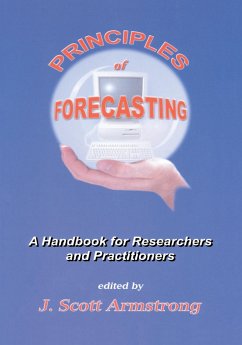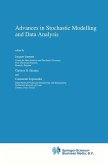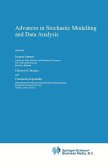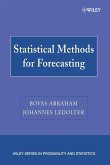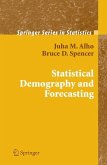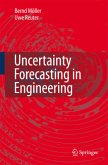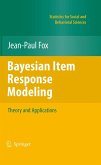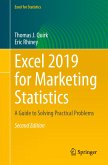Principles of Forecasting: A Handbook for Researchers and Practitioners summarizes knowledge from experts and from empirical studies. It provides guidelines that can be applied in fields such as economics, sociology, and psychology. It applies to problems such as those in finance (How much is this company worth?), marketing (Will a new product be successful?), personnel (How can we identify the best job candidates?), and production (What level of inventories should be kept?).
The book is edited by Professor J. Scott Armstrong of the Wharton School, University of Pennsylvania. Contributions were written by 40 leading experts in forecasting, and the 30 chapters cover all types of forecasting methods. There are judgmental methods such as Delphi, role-playing, and intentions studies. Quantitative methods include econometric methods, expert systems, and extrapolation. Some methods, such as conjoint analysis, analogies, and rule-based forecasting, integrate quantitative and judgmental procedures. In each area, the authors identify what is known in the form of `if-then principles', and they summarize evidence on these principles.
The project, developed over a four-year period, represents the first book to summarize all that is known about forecasting and to present it so that it can be used by researchers and practitioners. To ensure that the principles are correct, the authors reviewed one another's papers. In addition, external reviews were provided by more than 120 experts, some of whom reviewed many of the papers. The book includes the first comprehensive forecasting dictionary.
Hinweis: Dieser Artikel kann nur an eine deutsche Lieferadresse ausgeliefert werden.
The book is edited by Professor J. Scott Armstrong of the Wharton School, University of Pennsylvania. Contributions were written by 40 leading experts in forecasting, and the 30 chapters cover all types of forecasting methods. There are judgmental methods such as Delphi, role-playing, and intentions studies. Quantitative methods include econometric methods, expert systems, and extrapolation. Some methods, such as conjoint analysis, analogies, and rule-based forecasting, integrate quantitative and judgmental procedures. In each area, the authors identify what is known in the form of `if-then principles', and they summarize evidence on these principles.
The project, developed over a four-year period, represents the first book to summarize all that is known about forecasting and to present it so that it can be used by researchers and practitioners. To ensure that the principles are correct, the authors reviewed one another's papers. In addition, external reviews were provided by more than 120 experts, some of whom reviewed many of the papers. The book includes the first comprehensive forecasting dictionary.
Hinweis: Dieser Artikel kann nur an eine deutsche Lieferadresse ausgeliefert werden.
'...Its wide-ranging scope ensures that almost every type of forecasting activity is reviewed and summarised and distilled into principles by an expert in that particular field. ... Its broad scope and thorough summary of the available evidence makes it a valuable guide for any quantitative professional venturing into an unfamiliar area of forecasting.' -- John Aitchison, Director of DataSciencesResearch (www.DataSciencesResearch.com)
'This very readable handbook provides a comprehensive synopsis of the entire field of forecasting. The editor, Scott Armstrong, is highly qualified to pull together such a volume. He has been centrally involved in the development of the subject for more than two decades. Armstrong's publications cover the field, ranging from econometric modeling and the extrapolation of time-series data, to role playing and opinion-based forecasting; he is the author of the equally comprehensive book Long-Range Forecasting, which was published in 1978...In sum, Principles of Forecasting is a very handsome volume. It will be a welcome addition to any applied research library, and it should be kept near at hand by any statistician.' -- Journal of the Royal Statistical Society, Series D, The Statistician (forthcoming in 2003)
(For the complete review, please check: forecastingprinciples.com)
'... Armstrong's book goes beyond its stated goal of presenting the state of the art of forecasting research in the form of concrete principles; it sets the tone and direction for all future work in this area. The book has earned its place as the bible for forecasters and is a "must have" in every forecaster's library.' -- Journal of Marketing Research, XXXIX (2003)
'This very readable handbook provides a comprehensive synopsis of the entire field of forecasting. The editor, Scott Armstrong, is highly qualified to pull together such a volume. He has been centrally involved in the development of the subject for more than two decades. Armstrong's publications cover the field, ranging from econometric modeling and the extrapolation of time-series data, to role playing and opinion-based forecasting; he is the author of the equally comprehensive book Long-Range Forecasting, which was published in 1978...In sum, Principles of Forecasting is a very handsome volume. It will be a welcome addition to any applied research library, and it should be kept near at hand by any statistician.' -- Journal of the Royal Statistical Society, Series D, The Statistician (forthcoming in 2003)
(For the complete review, please check: forecastingprinciples.com)
'... Armstrong's book goes beyond its stated goal of presenting the state of the art of forecasting research in the form of concrete principles; it sets the tone and direction for all future work in this area. The book has earned its place as the bible for forecasters and is a "must have" in every forecaster's library.' -- Journal of Marketing Research, XXXIX (2003)
`...Its wide-ranging scope ensures that almost every type of forecasting activity is reviewed and summarised and distilled into principles by an expert in that particular field. ... Its broad scope and thorough summary of the available evidence makes it a valuable guide for any quantitative professional venturing into an unfamiliar area of forecasting.'
John Aitchison, Director of DataSciencesResearch (www.DataSciencesResearch.com)
`This very readable handbook provides a comprehensive synopsis of the entire field of forecasting. The editor, Scott Armstrong, is highly qualified to pull together such a volume. He has been centrally involved in the development of the subject for more than two decades. Armstrong's publications cover the field, ranging from econometric modeling and the extrapolation of time-series data, to role playing and opinion-based forecasting; he is the author of the equally comprehensive book Long-Range Forecasting, which was published in 1978...In sum, Principles of Forecasting is a very handsome volume. It will be a welcome addition to any applied research library, and it should be kept near at hand by any statistician.'
Journal of the Royal Statistical Society, Series D, The Statistician (forthcoming in 2003)
(For the complete review, please check: forecastingprinciples.com)
`... Armstrong's book goes beyond its stated goal of presenting the state of the art of forecasting research in the form of concrete principles; it sets the tone and direction for all future work in this area. The book has earned its place as the bible for forecasters and is a "must have" in every forecaster's library.'
Journal of Marketing Research, XXXIX (2003)
John Aitchison, Director of DataSciencesResearch (www.DataSciencesResearch.com)
`This very readable handbook provides a comprehensive synopsis of the entire field of forecasting. The editor, Scott Armstrong, is highly qualified to pull together such a volume. He has been centrally involved in the development of the subject for more than two decades. Armstrong's publications cover the field, ranging from econometric modeling and the extrapolation of time-series data, to role playing and opinion-based forecasting; he is the author of the equally comprehensive book Long-Range Forecasting, which was published in 1978...In sum, Principles of Forecasting is a very handsome volume. It will be a welcome addition to any applied research library, and it should be kept near at hand by any statistician.'
Journal of the Royal Statistical Society, Series D, The Statistician (forthcoming in 2003)
(For the complete review, please check: forecastingprinciples.com)
`... Armstrong's book goes beyond its stated goal of presenting the state of the art of forecasting research in the form of concrete principles; it sets the tone and direction for all future work in this area. The book has earned its place as the bible for forecasters and is a "must have" in every forecaster's library.'
Journal of Marketing Research, XXXIX (2003)

